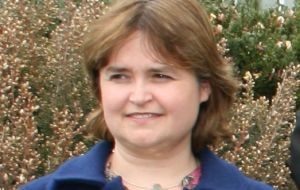MercoPress. South Atlantic News Agency
Falklands happy as British Overseas Territory and ‘don’t like being told by others what to do’
 MLA Emma Edwards said “full independence, free association or integration” are not suitable options
MLA Emma Edwards said “full independence, free association or integration” are not suitable options The Falkland Islands are happy with the current status of British Overseas Territory, based on the right to self determination and do not like being told by others what to do, Falklands’ Legislative Assemble member Emma Edwards told a United Nations decolonization seminar held in New Caledonia.
“We are happy with the status quo, and do not like being told by others what to do. The Falkland Islands are currently not ready for independence, but we do express our right of self-determination with almost all of the people of the Falkland Islands wishing to remain and enjoy our British Overseas Territory status” said MLA Edwards during the UN seminar to mark the 50th anniversary of the General Assembly’s Declaration on Decolonisation.
A key objective of the seminar was to help the Special Committee on Decolonisation (the ‘Committee of 24’) to assess progress towards decolonisation, particularly in the Pacific region.
The situation of the Falkland Islands was discussed on the second day of the seminar and MLA Edwards underlined that Falkland Islanders have repeatedly expressed their firm view that they are content with their current status, and noted that “for a variety of reasons the alternative options of full independence, free association or integration with an independent State are not suitable for the Falkland Islands”.
Outlining aspects of the healthy democracy enjoyed by Falkland Islanders, MLA Edwards informed the seminar that they included elections in November 2009, and a new Constitution, which had entered into force in January 2009, and “enhanced local democracy, establishing a greater degree of internal self-government and providing mechanisms for transparency and accountability”.
Miss Edwards also revealed that while the Falkland Islands had, like elsewhere, been affected by the global financial crisis “its economy remained strong” and cited a number of programs and initiatives in the areas of transport, telecommunications, energy, production, health care and education which benefited Falkland Islanders.
Looking back following the conclusion of the seminar organized and financed by the UN, MLA Edwards said it was “a very useful opportunity to meet representatives from other overseas territories and to discuss their issues with them, as well as meeting C24 member representatives”.
The seminar was entitled ‘The eradication of colonialism in the first decade of the 21st century’ and was attended by 48 delegates including representatives of non-self-governing territories, member nations of the Committee of 24, observers and experts on colonialism.
The final day of the seminar included a very interesting debate, which centred on how little progress on decolonisation has been made in the past ten years, with only New Caledonia expressing a wish to become a new nation.
There was also discussion on whether the word ‘eradication’ was too ambitious when discussing colonialism, with some delegates strongly of the view that the Special Committee should be finding ways to help the remaining territories on the UN Decolonisation List achieve more governmental autonomy rather than full independence.
On her return journey home to the Falkland Islands, while travelling through London, Miss Edwards attended the state opening of Parliament along with Falkland Islands Government Representative Sukey Cameron. This was followed by a reception hosted by the Commonwealth Parliamentary Association.
New Caledonia is a French overseas territory in the Pacific Ocean, discovered and named by Captain Cooke. It has a population of about 300,000 people, with 28 languages spoken across the Islands, although French is used as a common Language. The economy is based on nickel, with New Caledonia being the world’s second largest nickel exporter.




Top Comments
Disclaimer & comment rules-

-

-

Read all commentsComment removed by the editor.
May 27th, 2010 - 10:21 am 0So that leaves us with accurate reporting of speeches made by duly elected Argentine politicians is good and yet reporting speeches made by duly elected Falkland Island politicians is bad ivo?
May 27th, 2010 - 10:52 am 0Sounds like some sense is creeping in to C-24 ... we'll wait and see what the annual meeting produces next month. No indication of the Argentine reaction to this presentation I note?
May 27th, 2010 - 11:21 am 0The Falklands are British - nuff said!
Commenting for this story is now closed.
If you have a Facebook account, become a fan and comment on our Facebook Page!